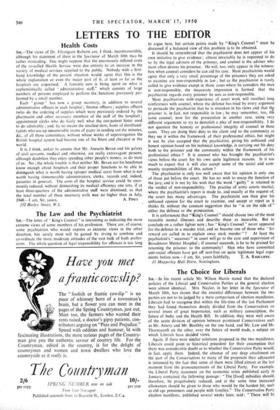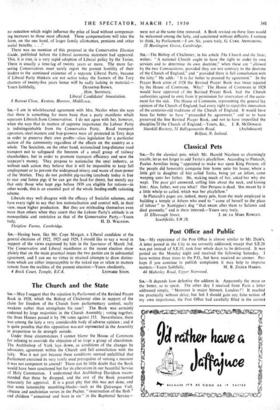The Choice for Liberals SIR,—In his recent article Mr. Wilson
Harris stated that the declared policies of the Liberal agtd Conservative Parties at the general election were almost identical. Mrs. Naylor, in her letter in the Spectator of March 10th, has shown that the essential differences between the two parties are not to be judged by a mere comparison of election manifestos. Liberals had to recognise that within the life-time of the last Parliament they had found themselves deeply divided from the Conservatives on several issues of great importance, such as military conscription, the future of India and the Health Bill. In addition, they were well aware of the acute division of opinion between prominent Conservatives such as Mr. Amery and Mr. Boothby on the one hand, and Mr. Law and Mr. Thornycroft on the other, over the future of world trade, a subject on which Liberals have decided views.
Again, if there were similar solutions proposed in the two manifestos, Liberals could point to 'historical precedent for their assumption that there was considerable doubt as to whether the Conservative Party would, in fact, apply them. Indeed, the absence of any deep attachment on the part of the Conseniatives to many of the proposals they adyocated is instanced by the fact that some of them were lifted almost at the last moment from the pronouncements of the Liberal Party. For example, the Liberal Party statement on the economic crisis published early in January contained the following passage: "The [food] subsidies should, therefore, be progressively reduced, and at the same time increased allowances should be given to those who would be the hardest hit, such as old age pensioners and people with families."- The Conservative Patty election manifesto, published several weeks later, said: "There will be
no reduction which might influence the price of food without compensat- ing increases to those most affected. These compensations will take the form, on the one hand, of larger family allohattces, pensions and other social benefits. . . ."
There was no mention of this proposal in the Conservative Election Gftisk,•published before the Liberal economic statement had appeared. This, it is true, is a very rapid adoption of Liberal policy by the Tories. There is usually a time-lag of twenty years or more. The more far- seeing Conservatives must surely regret the present hostility of their leaders to the continued existence of a separate Liberal Party, because if Liberal Party thinkers are not active today the framers of the Tory charters of twenty-five years hence will§ be sadly lacking in material.—
_„Hon. Secretary, Liberal Candidates' Association.
8 Retreat Close, Kenton, Harrow, Middlesex,



































 Previous page
Previous page